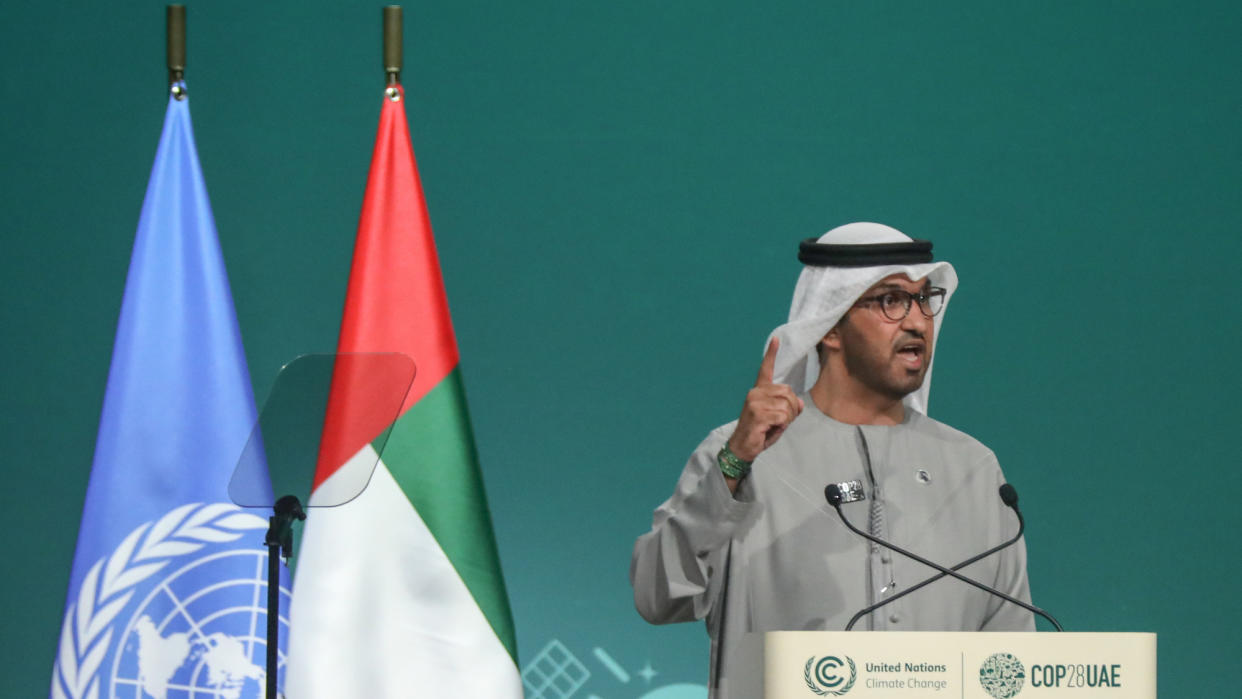Phase out vs transition away: difference in Cop28 wording explained

For the first time in history, the United Nations has adopted a deal in which its members have agreed to begin moving away from using fossil fuels.
Nearly 200 nations at the Cop28 climate summit in Dubai agreed to the deal, which calls on them to "transition away" from using fossil fuels to avoid the most severe consequences of climate change. However, the agreement immediately faced criticism from some member nations who had called for the term "phase out" of fossil fuels to be used, which was rejected by major oil-producing nations including Saudi Arabia, Russia and Iraq.
While the Cop president Sultan Al-Jaber called the deal "historic", there are still "plenty of problems" with it, said Fiona Harvey in The Guardian. Nevertheless, it "does represent significant progress" for those nations aiming to combat climate change, she added.
What does the deal say?
The deal, which spans 21 pages and outlines how the UN member states will collectively tackle climate change, was passed on Wednesday with no interventions or objections. However, it is "not a legally binding document" and so does not compel members to follow its rulings, said Esme Stallard at the BBC, but it does show a "path forward for countries on climate change".
It's the first time a Cop report has referenced a move away from fossil fuels, outlining that countries will "contribute" to the "transitioning away from fossil fuels in energy systems in a just, orderly and equitable manner", with 2050 the target date for global net zero. There is also an acknowledgement that global emissions will likely peak before 2025, while there is also support for tripling clean energy by 2030.
What are the criticisms of the deal?
The strongest criticism has centred on the language used with regard to moving away from fossil fuels. Even before the deal was formed, countries were "fundamentally divided" on what language should be used, said New Scientist.
Small island nations, some low-income nations, and Western superpowers including the US, UK and EU, all demanded "stronger language" in phasing out fossil fuels. What was considered "unqualified language" was opposed by countries dependent on oil and gas, and those seeking to use them for economic development.
It means the agreement is "fundamentally weak", said Justin Rowlatt at the BBC, and there is a "lack of compulsion" to really make countries act on the commitments made.
There is also criticism that, while the report references fossil fuels, the word 'oil' does not "appear anywhere" in the document, said Al Jazeera. The summit itself faced "criticism for close ties with fossil fuel interests from the start", particularly with UAE oil executive Al-Jaber overseeing proceedings.
The Alliance of Small Island States, which did not object to the agreement passing, said that the decision to pass it had been made while they were "not in the room" and criticised the deal for ignoring "what the science is telling us we should do", as well as its approach to loophole transition fuels and lack of financial support for nations hardest hit by the effects of climate change.
Rachel Cleetus, policy director at the Union of Concerned Scientists, also pointed out the lack of "requirement for richer countries to help poorer ones in transitioning away from fossil fuels", said Axios, calling it "seriously insufficient" to "close the energy poverty gap".
What next?
The new deal is the "biggest step forward since the Paris agreement", said Matt McGrath at the BBC, but it will "likely not be enough to keep global temperatures under the key 1.5C threshold". It could, in the long term, get the Earth "closer to net zero by 2050", he added, while the requirement for individual nations to submit "stronger carbon-cutting plans by 2025" may make the biggest difference if those with high emissions put "a rapid transition to green energy at the heart of their new plans".
The Cop28 agreement is "far from everything we need", said systems theorist and futurist Dr Nafeez Ahmed at Euronews, but it will play a "key role" in giving countries the "realisation" that the move away from fossil fuels is "ultimately unstoppable".
The focus should not be on "what we're leaving behind", he added, but looking at "how fast we can build the emerging post-carbon system".


